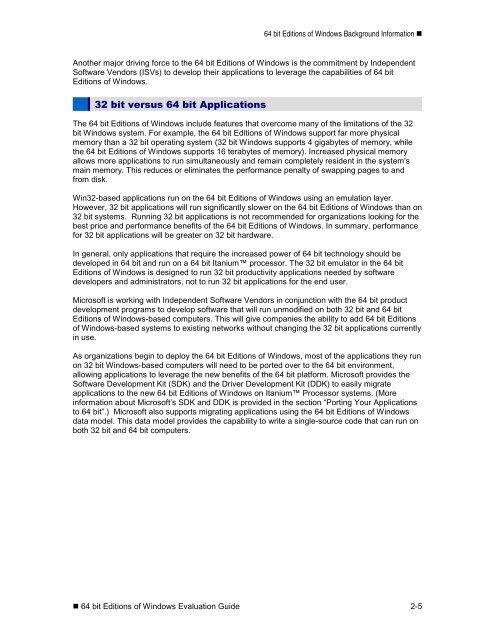64 bit Editions of Windows Evaluation Guide - Technology and Trends
64 bit Editions of Windows Evaluation Guide - Technology and Trends
64 bit Editions of Windows Evaluation Guide - Technology and Trends
You also want an ePaper? Increase the reach of your titles
YUMPU automatically turns print PDFs into web optimized ePapers that Google loves.
<strong>64</strong> <strong>bit</strong> <strong>Editions</strong> <strong>of</strong> <strong>Windows</strong> Background Information �<br />
Another major driving force to the <strong>64</strong> <strong>bit</strong> <strong>Editions</strong> <strong>of</strong> <strong>Windows</strong> is the commitment by Independent<br />
S<strong>of</strong>tware Vendors (ISVs) to develop their applications to leverage the capabilities <strong>of</strong> <strong>64</strong> <strong>bit</strong><br />
<strong>Editions</strong> <strong>of</strong> <strong>Windows</strong>.<br />
32 <strong>bit</strong> versus <strong>64</strong> <strong>bit</strong> Applications<br />
The <strong>64</strong> <strong>bit</strong> <strong>Editions</strong> <strong>of</strong> <strong>Windows</strong> include features that overcome many <strong>of</strong> the limitations <strong>of</strong> the 32<br />
<strong>bit</strong> <strong>Windows</strong> system. For example, the <strong>64</strong> <strong>bit</strong> <strong>Editions</strong> <strong>of</strong> <strong>Windows</strong> support far more physical<br />
memory than a 32 <strong>bit</strong> operating system (32 <strong>bit</strong> <strong>Windows</strong> supports 4 gigabytes <strong>of</strong> memory, while<br />
the <strong>64</strong> <strong>bit</strong> <strong>Editions</strong> <strong>of</strong> <strong>Windows</strong> supports 16 terabytes <strong>of</strong> memory). Increased physical memory<br />
allows more applications to run simultaneously <strong>and</strong> remain completely resident in the system's<br />
main memory. This reduces or eliminates the performance penalty <strong>of</strong> swapping pages to <strong>and</strong><br />
from disk.<br />
Win32-based applications run on the <strong>64</strong> <strong>bit</strong> <strong>Editions</strong> <strong>of</strong> <strong>Windows</strong> using an emulation layer.<br />
However, 32 <strong>bit</strong> applications will run significantly slower on the <strong>64</strong> <strong>bit</strong> <strong>Editions</strong> <strong>of</strong> <strong>Windows</strong> than on<br />
32 <strong>bit</strong> systems. Running 32 <strong>bit</strong> applications is not recommended for organizations looking for the<br />
best price <strong>and</strong> performance benefits <strong>of</strong> the <strong>64</strong> <strong>bit</strong> <strong>Editions</strong> <strong>of</strong> <strong>Windows</strong>. In summary, performance<br />
for 32 <strong>bit</strong> applications will be greater on 32 <strong>bit</strong> hardware.<br />
In general, only applications that require the increased power <strong>of</strong> <strong>64</strong> <strong>bit</strong> technology should be<br />
developed in <strong>64</strong> <strong>bit</strong> <strong>and</strong> run on a <strong>64</strong> <strong>bit</strong> Itanium processor. The 32 <strong>bit</strong> emulator in the <strong>64</strong> <strong>bit</strong><br />
<strong>Editions</strong> <strong>of</strong> <strong>Windows</strong> is designed to run 32 <strong>bit</strong> productivity applications needed by s<strong>of</strong>tware<br />
developers <strong>and</strong> administrators, not to run 32 <strong>bit</strong> applications for the end user.<br />
Micros<strong>of</strong>t is working with Independent S<strong>of</strong>tware Vendors in conjunction with the <strong>64</strong> <strong>bit</strong> product<br />
development programs to develop s<strong>of</strong>tware that will run unmodified on both 32 <strong>bit</strong> <strong>and</strong> <strong>64</strong> <strong>bit</strong><br />
<strong>Editions</strong> <strong>of</strong> <strong>Windows</strong>-based computers. This will give companies the ability to add <strong>64</strong> <strong>bit</strong> <strong>Editions</strong><br />
<strong>of</strong> <strong>Windows</strong>-based systems to existing networks without changing the 32 <strong>bit</strong> applications currently<br />
in use.<br />
As organizations begin to deploy the <strong>64</strong> <strong>bit</strong> <strong>Editions</strong> <strong>of</strong> <strong>Windows</strong>, most <strong>of</strong> the applications they run<br />
on 32 <strong>bit</strong> <strong>Windows</strong>-based computers will need to be ported over to the <strong>64</strong> <strong>bit</strong> environment,<br />
allowing applications to leverage the new benefits <strong>of</strong> the <strong>64</strong> <strong>bit</strong> platform. Micros<strong>of</strong>t provides the<br />
S<strong>of</strong>tware Development Kit (SDK) <strong>and</strong> the Driver Development Kit (DDK) to easily migrate<br />
applications to the new <strong>64</strong> <strong>bit</strong> <strong>Editions</strong> <strong>of</strong> <strong>Windows</strong> on Itanium Processor systems. (More<br />
information about Micros<strong>of</strong>t’s SDK <strong>and</strong> DDK is provided in the section “Porting Your Applications<br />
to <strong>64</strong> <strong>bit</strong>”.) Micros<strong>of</strong>t also supports migrating applications using the <strong>64</strong> <strong>bit</strong> <strong>Editions</strong> <strong>of</strong> <strong>Windows</strong><br />
data model. This data model provides the capability to write a single-source code that can run on<br />
both 32 <strong>bit</strong> <strong>and</strong> <strong>64</strong> <strong>bit</strong> computers.<br />
� <strong>64</strong> <strong>bit</strong> <strong>Editions</strong> <strong>of</strong> <strong>Windows</strong> <strong>Evaluation</strong> <strong>Guide</strong> 2-5



